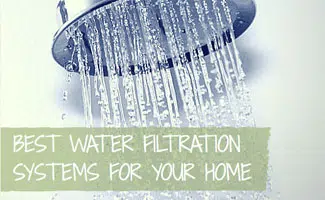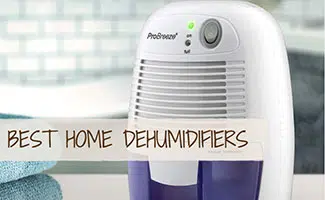When you purchase through links on our site, we may earn a commission. Here’s how it works.

Unfiltered water can result in bathing water that leaves a film on your body or your skin dry and drinking water that has a bad aftertaste. Installing a filtration system can help purify the water in your home to improve your overall health and well-being.
Best Whole House Water Filter: Aquasana EQ-1000 Review
The Aquasana line of water filters is one of the most versatile and comprehensive solutions on the market. While the upfront cost is a little on the pricier side, it more than pays for itself over the long haul. Not only are the filters inexpensive to replace, they last a long time. The filtration system itself is also extremely reliable and dependable.
The Aquasana Rhino water filter comes in a variety of capacities, but for the price, the 1000 is the best bet. The 1000 is certified to last up to 1,000,000 gallons and has a 10 year warranty. All of these factors make the Aquasana EQ-1000 our choice for the best whole house water filter.
Each system comes with a number of add-on features like a UV filter, a salt-free softener and a sub-micron post-filter. One of the unique features is the upflow, dual tank design which increases the water contact time with contaminant grabbing media and prevents clogging or media channeling.
The Aquasana filters are simple to install and easy to maintain. Backed by a guarantee and excellent customer service, the Rhino is a good bet when it comes to choosing a whole house water filter.
Pros
|
Cons |
|
|
Pricing
What Is The Difference Between Hard & Soft Water?
Water levels can have a different balance of chemicals in them. Depending on the types and quantities of chemicals in the water, it is often referred to as being “soft” or “hard.”
Hard Water
Hard water has a high content of minerals including limestone, chalk and dolomite. While not dangerous to drink, it can lead to buildup of limescale which can cause corrosion or damage to your pipes. It can also cause your soap not to lather, resulting in scum. Eventually, the accumulation of lime can lead to blocks in your sewage lines, which can be costly to repair.
Soft Water
Soft water is the outcome of removing the minerals and chemicals in hard water. The mineral ions that produce hard water are replaced with sodium ions. Having a higher sodium content in your water could harm houseplants, but shouldn’t affect your health since the amount is minimal relative to your overall sodium intake. You can “soften” your water, and minimize your exposure to sodium, by attaching a water softening system to the hot water line only, so that only half of the water you use is softened with sodium.
How Can You Tell If Your Water Is Hard Or Soft?
Over half the U.S. has hard water, with the midwest and parts of the south being especially prone to it. To find out for sure, you can do a number of things:
- Check with your local government’s water department, which puts out a water quality report.*
- Reference the Environmental Protection Agency’s website, which has resources and guides to understanding the water in your area — from where it comes from to annual reports of usage.*
- Notice if white residue builds up around your faucet or shower head.
- Get a home test kit for a more accurate result. We recommend the AquaChek Water Quality Test Strips from Amazon. They are easy to use and come 50 to a package. If you go the scientific route, there are two methods to measure hardness: grains per gallon or milligrams (or parts) per liter. Less than one grain per gallon or 17 milligrams/parts per liter is considered soft and over 7 grains per gallon or 120 milligrams per liter is considered hard.
- Do an at-home test without a kit using a water bottle filled with bath water and dish soap (as shown in the video below). If the water suds up after you shake the bottle then your water is soft, if it’s flat and leaves a white film, then it is probably hard.
*These resources give a general idea of the water in your area and are not specific to your home.
Why A Home Water Filter?
There are several different methods to softening water:
- Using an ion-exchange device
- A lime softening process
- Reverse osmosis
- Distillation or water boiling.
However, those solutions can be expensive and time-consuming. The most common home remedy is to use a water filtration system. A home water filter easily removes impurities in your water at a fraction of the cost of softening. Filters are installed between the water source and the faucet that dispenses, which intercepts and traps the mineral ions and keeps them from getting through. There are a number of reasons that this can be beneficial:
- Cooking – filtered water produces stronger flavors, quicker cooking times and overall better results in the kitchen. Even ice and coffee will taste better with filtered water.
- Better Drinking Water – chlorine-free drinking water is fresh, clean and great-tasting. It also removes harmful pesticides, metals and solvents.
- Softer Skin – results in less dry, flaky skin that can cause irritation and rashes.
- Shiny Hair – hard water can leave your hair feeling dirty and slimy whereas soft water will make your hair feel healthy and smooth.
- Cleaner Clothes – leave your laundry feeling fresh and smelling great by washing in better quality water.
- Protect Your Pipes – prevent your home’s valuable plumbing system from eroding over time by pumping only clean water through the pipes.
- Save Money & The Planet – eliminate the need for buying expensive and wasteful bottled water.
Other Whole House Water Filter Reviews
Home water filters range in capacity depending on how large your home is and how many bathrooms and sinks you want to filter. They also vary in flow rate and filter life. (It also depends on how often and how much water you use.)
Another thing to look for in a whole house water filter is whether it’s been certified by the National Science Foundation (NSF). The NSF provides industry standards based on product tests and audits.
The NSF 42 standard specifically covers minimum requirements for drinking water treatment systems that includes “material safety, structural integrity and aesthetic, non-health-related contaminant reduction performance claims.” It’s not a requirement to have an NSF certification, but having this certification sets certain filters apart since they are endorsed by a government agency that has the public’s health and safety in mind.
With so many whole home filters it can be overwhelming to decide which are the best. We reviewed the most popular, highest rated and widely used home water filtration systems on the market to provide you with enough information to find the right fit for your home.
3M Aqua Pure | Dupont WFHD13001B | Home Masters HMF2SDGC | SpringWell
3M Aqua Pure Review
The Aqua-Pure Water Filter System is another solid option at a fraction of the price of our first place pick, Aquasana. The AP903 model is for city water while the AP902 is designed for well water. With a flow rate of around 75 liters (20 gallons) per minute, it’s built to support most larger homes or even small commercial properties.
Made with non-corrosive stainless steel, it will last the test of time. The filter is integrated into the cartridge and requires no tools or contact with the filter itself to replace. Though the up-front cost is less, the filters are more expensive. Each filter will last you about a year.
Pros
|
Cons |
|
|
Pricing
DuPont WFHD13001B Review
The Dupont WFHD 1300 features a universal system that makes it easy to upgrade filtration with other higher performing DuPont filters. It comes with a tank wrench to install tightly, but many users complain that it does not come with the mounting bracket which is sold separately (view on Amazon).
With a water flow of 10 gallons per minute, it’s about half the flow rate of the Aquasana and the 3M models, but is a solid option for a small to mid-size home that has lower usage. Although the filters are inexpensive, because of their smaller size they need to be replaced every 90 days or so. This filter is a great value for the price.
Pros
|
Cons |
|
|
Pricing
- Check Amazon for availability
- Mounting Bracket: Check Amazon for availability
Home Masters HMF2SDGC Review
The Home Masters HMF2SDGC is a dual-filter system providing double filtration for maximum quality water. The dual chambers also make it a twice as heavy (over 30 lbs) so make sure you have a sturdy wall or stud to mount it to. The hefty size comes with a large 100,000 gallon capacity and high flow rate (up to 15 gallons per minute).
The replaceable filters are easy to swap out and provide up to a full year of clean water for a family of four (View the Radial Flow GACC Carbon Filter on Amazon). The Home Masters has high reviews but it’s unclear if the product meets the NSF standards. If you’re looking for a reliable, heavy duty filtration system this will be a great pick.
Pros
|
Cons |
|
|
Pricing
SpringWell Whole House Water Filtration System
SpringWell’s ActivFlo 1 million gallon filtration system uses a proprietary 4-stage design that allows the most contact time between the filter and the water. You can install the system indoors or outdoors (as long as it’s above freezing). They stand behind their product and have a 6-month return policy which allows you to try and get a full refund if not fully satisfied.
You replace the filters every 6 to 9 months, and they are sold separately for $34.96 for a two-pack. They also have an optional UV water purification system available as an add-on for killing cryptosporidium and giardia. The kit comes with everything you need to install yourself, and they have customer service via phone and email if you need additional assistance.
Pros
|
Cons |
|
|
Pricing
- Check Amazon for availability
- Free shipping over $29
Video: How To Install Whole House Water Filtration System
Watch this video from This Old House as they install a whole house water filtration system in five minutes.
Is My Water Safe?
There are a number of local and federal agencies including the Environmental Protection Agency (EPA) that regulate the standards for ensuring that our drinking water is potable and safe. Rest assured there are thorough checks and balances in place that make your water completely safe to consume before it ever reaches your home. In fact, city water is better regulated than the bottled water industry so your home water may be safer too.
If drinking water comes from a private well, the homeowner is responsible for the safety. While EPA rules do not apply to private wells, some states may have well water safety rules. Either way, it’s recommended that well water users have their water tested annually. Read our reviews of water test kits to find the right solution for your home.
If you find yourself drinking or cooking with a lot of water, you might also consider a water filter for your kitchen.
What solutions have you used to insure your water is safe?
Tagged With: Comparison, Water






